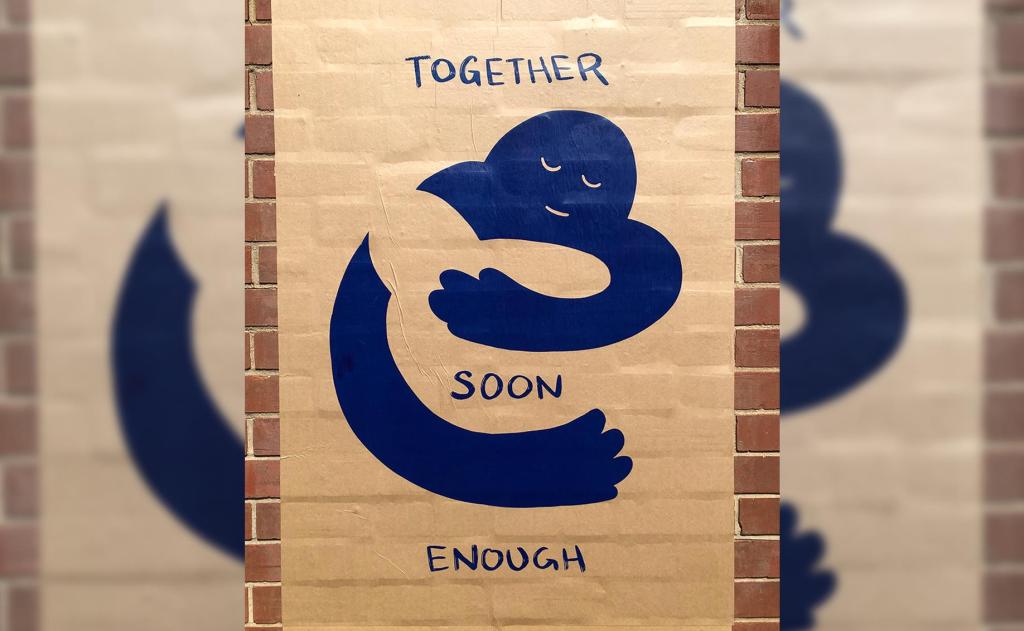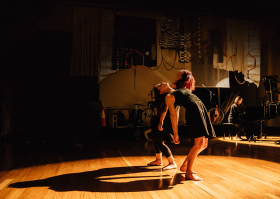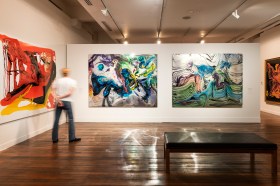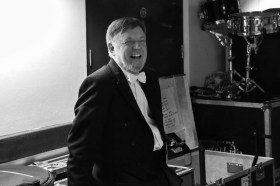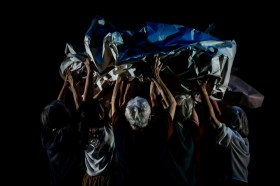Travel is transformative for an artist’s practice, yet COVID-19 has reshaped arts residencies and postponed travel and touring for many creatives, changing not only the way they work, but how they interact with audiences and other artists too.
EPISODE 10: THE NOT-IN-TRANSIT LOUNGE
In Episode 10 of the ArtsHubbub: The Not in Transit Lounge, artist Peter Drew, Executive Director of Res Artis Eliza Roberts author Craig Silvey and choreographer Natasha Sturgis discuss how travel stimulates creativity and the ways we can still connect to culture during this time of widespread upheaval caused by the pandemic.
‘I was living overseas, and I think that experience, it must always bring home ideas of belonging and, because I suddenly became the “Australian guy”. It’s sort of imposed upon you. So I thought a lot about what it means to be Australian, what I liked about that, what I would like to change about that, if that’s something I could do, and being in art school, you’re encouraged to try new things,’ he said.
‘Until then, I really didn’t like most political art, because it’s so didactic, propagandistic, all those things. But I thought, I’m in art school I should give it a go. And both major parties were promising to stop the boats. And that phrase seemed particularly absurd to me, coming from a nation of immigrants. And so I designed a poster in the style of somebody from the 19th Century, and it said, “Australia says, Stop the boats; to avoid Aboriginal genocide stop Great Britain’s illegal migration to Australia.” And I had an image of a boat from the First Fleet, which I took from a painting and reproduced, I travelled down to London and stuck them up. And they were quite popular. And it made me think that maybe there was something that I could pursue within political art.’
Choreographer Natasha Sturgis was all set to take part in a creative residency at Myall Lakes in northern NSW when instead she found herself at home adapting a new dance work for an online audience instead of rehearsing with her dancers.
‘I don’t think there’s any substitute really, for being able to be in a space and to be with moving bodies and to feel that energy,’ Sturgis said.
‘It was a strange time to force yourself to create, you never really want to do that. You always want it to be as organic and natural as possible.’
Sadly having a residency cancelled or adapted was a reality for many artists during COVID. Eliza Roberts from Res Artis, a worldwide network of arts residencies operators, said recent figures indicate that 54% of planned residencies this year were cancelled.
‘I’d sort of be in the wrong field, if I thought that residencies and in person exchange could be entirely replaced by virtual means. I don’t think they can be and, you know, really, nothing can replace that face to face or in-person experience.’
– Eliza Roberts
Roberts said the way artists and arts operators have embraced arts residencies has changed and will reshape the industry completely.
The transformative nature of travel is not lost on author Craig Silvey who spoke about what it’s like to promote his new book Honeybee from home instead of on tour.
‘The truth is that being on the road, connecting with readers, talking to people about the book, hearing their responses, that’s the stuff that fills me back up,’ he said.
And while Zoom may be a temporary fix for virtual book launches and those completing an arts residency from home, the experience of interacting face to face, whether it be with your audience or a collaborator, can never be matched according to Roberts.
‘I’d sort of be in the wrong field, if I thought that residencies and in person exchange could be entirely replaced by virtual means. I don’t think they can be and, you know, really, nothing can replace that face to face or in-person experience,’ she concludes.
The ArtsHubbub episode 10 is out now via your favourite podcast platform
THE ARTSHUBBUB EPISODE TEN: TRANSCRIPT
[Music starts]
GD: Welcome to the ArtsHubbub, a monthly look inside Australian arts… and artists. I’m your host George Dunford.
Travel stimulates creativity – whether it’s a performer touring a show internationally or a painter looking back at their own culture from a distant land. But the Coronavirus has clipped all our wings – closing borders and locking down some areas completely – so this month, we wanted to look at travel without moving – how artists have benefitted from being away and how they might be maintaining that external stimulus for their practice.
We talk to visual artist and activist Peter Drew, famous for his posters and paste-ups that ask us to refine our thoughts about Australian identity. A watershed moment for Peter was at the Glasgow School of Art, where they didn’t quite get what he was doing.
Peter Drew: I was accepted into the Glasgow School of Art based on my illegal street art projects. They loved them when they were happening here in Australia, but when I kept doing them in Glasgow, the school got a bit nervous. And like any institution, they were risk adverse. They thought this might not go well for us. So they started sending me emails asking me to stop.
GD:We’ll discover how that worked out in our in-depth interview.
For the Nudge, our professional development section, we talk with Western Australian writer Craig Silvey about how he was able to promote his new book, Honeybee, without leaving the state. Plus, Eliza Roberts from Res Artis describes the impact of COVID on artist residencies, and choreographer Natasha Sturgis tells us about the pros and cons of making a new dance work virtually, instead of physically, during lockdown.
Peter Drew is best known for his re-interpretations of what an “Aussie” is through a series of posters that include Indian-Australian Monga Khan and other Australians who have been lost in the whitewashing of history. He recently wrote a memoir Poster Boy, about what drove him into street art and finding a political bent to his work.
ArtsHub’s Gina Fairley spoke with Peter Drew in South Australia in February before COVID travel restrictions had really hit.
Gina Fairley: We’re sitting here in your studio at home. Birds outside, which is gorgeous. You built the studio last year, I understand. How do you manage home and studio life?
Peter Drew: It’s a bit of a juggle.
[Birds chirping]
Peter Drew: My wife Julie she works from home also. She has a practice making clothing, scarves and socks and so our lives are very similar in some ways. And that helps, because we can negotiate. And it’s about finding a rhythm. And we’re always in sync with each other, but not often with the rest of the world.
GD: Earlier in his career, Peter had been living overseas in the UK, which shaped his practice and perspective as an artist.
[music plays in background]
Gina was interested in how he tried to decolonise the “stop the boats” messages that both sides of Australian politics were campaigning on. His art was more potent because he was protesting at the heart of the old British Empire.
Peter Drew: While I was living overseas – and I think that experience – it must always bring home ideas of belonging and I – because I suddenly became the Australian guy. It’s sort of imposed upon you. So I thought a lot about what it means to be Australian, what I liked about that, what I would like to change about that, if that’s something I could do, and being in art school, you’re encouraged to try new things. And I, until then, really didn’t like most political art, because it’s so didactic, propagandistic all those things. But I thought, I’m in art school I should give it a go. And both major parties were promising to stop the boats. And that phrase seemed particularly absurd to me, coming from a nation of immigrants. And so I designed a poster in the style of somebody from the 19th century, and it said, “Australia says, Stop the boats; to avoid Aboriginal genocide stop Great Britain’s illegal migration to Australia.” And so – and I had an image of a boat from the First Fleet, which I took from a painting and reproduced, I travelled down to London and stuck them up. And they were quite popular. And it made me think that maybe there was something that I could pursue within political art.
[music fades out]
Gina Fairley: I understand the media were very quick to take notice of those posters in London. What was their reaction?
Peter Drew: Well, I had a few run-ins with my school. And it was, it was already happening before then actually. I was accepted into the Glasgow School of Art based on my illegal street art projects. They loved them when they were happening here in Australia, but when I kept doing them in Glasgow, the school got a bit nervous. And like any institution, they were risk averse. They thought this might not go well for us. So they started sending me emails, saying that – asking me to stop. And it started off polite, and then became more forceful. They we’re going to review my status at the school. And, I um, it really annoyed me because I thought it was cowardly, and they were only doing it because no one could see what they were doing. And I thought they should feel embarrassed about it. And so I went to the media, and they wrote a story about it, because it seemed like such a conservative thing to be doing.
Gina Fairley: Why has it been important for you to place those conversations on our streets?
Peter Drew: It started small, as I said before, I started talking about politics and national identity became what I was discussing. And so once you start on a topic, you’re in some way obliged to try to say everything, as impossible as that is. And so it really went from immigration, to belonging, and then it opens up to sovereignty and, and everything. And it’s an impossible task, especially for one individual to make a complete picture. And so I sort of learnt that slowly but surely.
In a way, I definitely am an activist. But first and foremost, I’m an artist. And I think that’s worth claiming and sort of holding on to because, well, the question becomes, Why be an artist at all? Why not just be an activist? What is this art thing? Anyway, I think it’s holding me back. All I care about is politics and creating change. And as soon as you do that, you lose something. So it’s worth, before you throw it out, it’s worth taking a second to assess what that might be. And I think a crucial element of what art is, is curiosity and imagination, those are fundamental and, an uncertainty. To be a good activist, to be an effective activist, you need a certain element of political certainty. This is the way it is, this is what’s wrong, this is how we’re going to fix it. That’s what’s appealing. That’s, that’s what’s appealing about propaganda. But as soon as you do that, you surrender your curiosity. You surrender part of your imagination – the part that thinks maybe the other side’s right. Maybe there’s something I’m missing, maybe there’s room for negotiation. Those things are, you know, powerful within art, and if surrender them at our own peril, especially if you like art.
Gina Fairley: You’ve posted what, maybe 4000, 5000 posters, what do you think?
Peter Drew: It’s over 4000 now, I’ve lost count but, ah…
Gina Fairley: Have you ever been arrested?
Peter Drew: A couple of times, and it always happens when I’m with somebody else. I’ve gone out with some, a helper. I’ve really only done it…
[background laughter]
Peter Drew: I can think of doing it twice. And those are the two times which I was arrested, because as soon as you see two people doing a job which one person should be able to do, it looks suspicious.
Gina Fairley: [Laughs]
Peter Drew: And yeah, the thing about getting arrested is that it’s kind of boring in a lot of ways. That’s the worst thing about it is just how long it takes. And yeah, it’s not really as dramatic as you might think.
GF: [Laughs]
[Music fades in]
Peter Drew: I got back from Glasgow, and I knew I wanted to make more politically focused art. So what I did is started to get in contact with asylum seekers in and out of detention and provide them with art materials, just very simple in the form of notebooks and pens, and I just asked them to draw their story. And I was really looking for somebody who loved to draw. And I found Ali, and he filled up two notebooks full of drawings, and they told his whole story from leaving Afghanistan, because his father was killed by the Taliban, then his brother was killed in Quetta in Pakistan. And so he had this traumatic life that he was able to draw in these notebooks, and it was incredible.
And I took the images and made them into – just blew them up – just made them into very large paste-ups. And I didn’t, I said I wanted to surprise him because I thought, you know, he does deserve a surprise. And so I said, Listen Ali, I’m going, I’m going to do something with these images, just trust me. And we’re becoming friends. And so it was, you know, it was nice to be have – given that and then we sort of took him into the city and showed him all these drawings. And he was very happy about it, obviously. And they worked as art, I think, because they were so empathic, they had a great effect on the people that saw them. But they weren’t effective as propaganda, or as activism in some ways, because they were so full of nuance, you really had to stand in front of them and read story, and there’s so much information to absorb. And it really made me think about, what is it that makes effective propaganda?
It has to be punchy, you have to strip the nuance out of it, you have to make it simple and, and false in some ways, really, to take the nuance out of things it does simplify things to the point of which they are not the whole truth. But that was what I was interested in, because I because I think fundamentally, what I make is art disguised as propaganda, and it sort of examines why do we want propaganda?
[Music fades out]
Gina Fairley: Were you ever accused of promoting a narrative that you perhaps didn’t own or have authority to use those voices?
Peter Drew: That sort of touches on the idea of cultural appropriation that sort of the way it’s expressed. I don’t – I have some mixed feelings about it. I have a view that cultural appropriation is really an anti-cultural concept, in some ways, because what it does fundamentally is subordinate culture to politics. And I think, ultimately, the job of culture, if it is something that we believe in, is to transcend political boundaries, and to reveal that it is possible to empathise across these boundaries. In some ways, it’s the artist’s job to transgress. And, there are times at which the culture is prepared for that to happen, and there are times at which the culture closes down and enforces those boundaries. So, and that’s the negotiation, I’m not sort of an absolutist. And so there’s, you do what you can.
[Music starts]
Peter Drew: And I understand that obviously, historically, some cultures, some people have had a much harder time than others. But to – I always think that if some group of people, or some culture, becomes labelled as having been fundamentally hard done by that, that hurts those people for that to become their identity. And I always feel apprehensive about just buying into that completely. So yeah, there’s never, it’s yeah, I just get very suspicious when anyone declares themselves to be on the right side of history, that shows a certain level of political certainty, which I’m just not comfortable with. It’s dangerous.
GD: Since we caught up with Peter he’s created Together Soon Enough to remind us all that after COVID relaxes we will be reunited again. You can see his work on his website peterdrewarts.com
[Music fades out]
[Upbeat music begins]
[Ad break]
Sabine Brix: After a difficult 2020, Artshub wants to reimagine the future and we invite you to join us when we present our online conference, Visions 2020. Held on 9 December, Visions 2020 will bring together our community to talk about how the sector can improve on funding, diversity and more.
For program announcements and members ticketing offers head to events.artshub.com.au/visions2020
[Upbeat music ends]
[Nudge theme music begins]
GD: Now for the Nudge, our monthly look at improving your arts practice.
How do you travel when borders are closed?
What happens when you’re awarded a residency but can’t physically attend because of the risks of COVID-19- or when you’re halfway through a residency and get stuck when the borders are closed?
This month, we talk to artists and arts administrators about adapting to the unusual circumstances of 2020, and what they’ve learned about working under these conditions.
Earlier this year, independent choreographer Natasha Sturgis returned to Sydney from London, having been awarded a two-week artist’s residency at Myall Lakes on the mid-north coast of NSW.
[Music fades out]
Natasha Sturgis: I was really hoping to use this residency for, yeah, for two weeks to really generate a whole lot of movement to kind of extend upon some ideas, which I’d already established. Especially because, being an independent maker when I was creating my previous works, it was, it was a long period of time of a rehearsal here or a rehearsal there in between other jobs. So to have the two-week block, to be in the studio for the full two weeks to really research and have that time uninterrupted, was something I was really looking forward to.
GD: Unfortunately, that’s when COVID hit, forcing Natasha – and the dancers she was expecting to work with – into lockdown. Nursing her dog Molly, Natasha tells us a little about the process.
Natasha Sturgis : It was a strange time to force yourself to create, you never really want to do that. You always want it to be as organic and natural as possible. But yeah, it was an opportunity I didn’t want to, want to waste…
GD: Rather than abandon the residency, Natasha pressed ahead – expanding the number of dancers she had expected to be working with and adapting the creative development process in order to work online.
Natasha Sturgis: Because I know how to create in a studio, and that’s, that’s what I’m good at, so I really wanted to approach the residency as close to that process as possible. So I essentially had my idea that I wanted to, you know, that I wanted movement to be inspired from, and something that I wanted to explore. And so I gave my dancers kind of a bit of a backstory, but then I also gave them specific tasks to respond to. And they, they filmed themselves improvising, and then sent that back, we had a little whatsapp group. And so that was kind of round one. And then I went through each individual video, and I pulled out the bits, which I thought were really, really special. And then I sent my dancers those back for them to respond and refine.
[Music starts]
GD: Natasha was one of the lucky ones who could make a revised, digital residency work. But 54% of planned residencies this year were cancelled, modified, cut short or postponed because of COVID-19, according to stats released by Res Artis, in conjunction with University College London.
Eliza Roberts: Those results, or the survey was undertaken back in May this year. Um, so not even that far into the pandemic. And those were the figures that were backing up, what we were seeing in the field.
GD: Eliza Roberts, the Executive Director of Res Artis, which is a network of arts residency operators from around the globe, tells us more about the impact COVID-19 on artists’ residencies, as well as on the organisations who support such programs.
[Music fades out]
Eliza Roberts: I think at that time, Res Artis was really being bombarded, and around the clock from artists who were stranded in residence. And so people, you know, for example, I can remember stuck in Japan who were needing to get back to South Korea and to the States. So we were able to sort of assist them by way of connecting with their local consulate in Japan. Then there was also the flipside, which were the arts residency operators, who were basically going under due to travel restrictions and physical distancing measures. So yes, all of all of these add up to a very destructive moment for the arts residencies landscape.
[Music starts]
GD: Western Australian writer Craig Silvey’s work has been disrupted by COVID. Normally he’d be out promoting his new book, Honeybee, published in September, but with state borders closed, the traditional publicity tour has been very different.
Craig Silvey: The book industry has actually remained fairly solid, that the dips in numbers, you know, haven’t been anywhere near as, as high as were initially anticipated. So that’s been really heartening. But in terms of releasing books, and connecting with readers beyond Western Australia, it’s been all about the virtual events. But it’s been really wonderful. It’s been, it’s been lovely. I mean, it’s different. I have to say it’s a different feel to being in a room with people. But you know, it’s no less rewarding. It’s just, it’s just a, just a different phenomenon, I think…
[Music fades out]
GD: While Natasha and her dancers were able to make an online residency work, she said it was far from an ideal way to create new choreography.
Natasha Sturgis: When I was doing this residency, the process, it lacked momentum, because obviously there’s a time lag but also because people are trying to fit in these tasks in between their day, it meant that it was really hard to capitalise, yeah, capitalise on that momentum. Although we were able to generate a lot of movement in the experimental exploratory stage, if we were to kind of refine those ideas and trying to collect them into a more of a structure, we’d definitely need to be in the space.
GD: As well as the delay it took to respond to the dancers’ individual movements, Natasha says the creative process was constricted by the lack of physical space available to each of the dancers during the virtual residency.
[Music starts]
Natasha Sturgis: So many people were dancing in living rooms and dogs and cats running around, and you’ve got your four square metre, little lounge room. So not having the not having the space to respond from the movement that’s in the room and having that, that energy, the energy from moving bodies…
[Music fades out]
GD: Digital book launches also lack the intimacy and energy of the live experience, according to Craig.
Craig Silvey: Yeah, in terms of the intimacy of the event, there’s nothing quite like stepping out in front of a crowd of people at a physical event. And you know, there’s always that awkwardness and hint of anxiety and separation between author and audience, which is just slowly overcome, and you both send your tendrils out over the course of a conversation and connect in the middle and the mood in the room by the end of an event is very intimate, you know? It’s a really beautiful thing that you both reach out to each other. And so that sensation is a little harder to engineer, I suppose, over Zoom. I’m doing my best to, to connect with people. But from my end, I don’t get much feedback…
GD: Like many writers Craig finds touring a book an interesting experience because he finds out how his book is received and it’s very different to the private work of writing.
Craig Silvey: You know, people often think that when you finish your manuscript, and when you you know, when you cap it off with that final, full stop, you feel relieved, and overjoyed and proud of yourself and all these things. But the truth is, you just feel profoundly empty, you feel hollowed out, you feel wrung out, you feel as though you are just drained, it’s a really strange phenomenon. But the truth is that being on the road, connecting with readers, talking to people about the book, hearing their responses, that’s the stuff that fills me back up. That’s really enriching. And, you know, the good and the bad, not every response, obviously, is uproariously positive, it’s fascinating to receive all manner of challenges and criticism, and to be part of that conversation as well.
[Music starts]
GD: On a positive side, Natasha said that taking her choreographic residency online gave her a greater sense of connection with the dancers she was working with.
Natasha Sturgis: I spent a lot of time travelling and dancing for the last couple of years. And so to be able to continue those connections has been, yeah, really, really helpful. And the online context, it’s just it’s so important for that. But I don’t think there’s any substitute really, for being able to be in a space and to be with moving bodies and to feel that energy. And that’s something that yeah COVID and 2020, has really made me appreciate more.
[Music fades out]
GD: Craig has only ever gone on one residency and it didn’t turn out as planned.
Craig Silvey: And look, it confirmed to me I have to say that that residencies just aren’t for me. I’m very ritualised as a writer, I’m very routine based. And so being in a new space, and it just takes time for me to to adapt to, you know, I need to feel really secure in my surroundings in order to drift off and occupy the space that an author needs to be inside to get work done. However, I certainly see how it works for other people. Other people are invigorated. Other authors are invigorated by being in a space like Varuna, where you can talk through ideas with other authors and brainstorm and knock ideas between each other and delight in that. I am the complete opposite. I sit with my work very privately. I don’t show anyone developing work until I’m certain that it’s almost ready. And so a residency just doesn’t that just doesn’t work for me, unfortunately,
GD: Eliza believes that nothing can ever truly replace the experience – and the creative impact – of undertaking an artists’ residency.
Eliza Roberts: I’d sort of be in the wrong field, if I thought that residencies and in person exchange could be entirely replaced by virtual means. I don’t think they can be and, you know, really, nothing can replace that face to face or in-person experience. And, you know, even the term residency derives from residents, which is, you know, to reside in a place. So, I think that’s really important. And I do truly believe that that will take place again, once we get through this difficult time. And I actually think in that regard, residencies are going to play a very important role. I think through, you know, by their very nature of international travel, and intercultural understanding, and people-to-people exchange on-the-ground exchange, I think they really will play a pivotal role in reopening borders, and intercultural exchange worldwide.
GD: That said, Eliza is also expecting to see residencies evolve.
Eliza Roberts: I actually imagine, as the field changes as a result of the impact of COVID-19, the definition of what constitutes an arts residency is going to shift. And so it wouldn’t surprise me if it becomes a bit more flexible, and takes into account these types of models where it might be sort of more studio based or community festival based, for example, without that live in requirement.
[Music starts]
Eliza Roberts:So yes, I think that will take place as well as you know, a rise in local exchange in digital forms as well.
[Music fades]
[Theme music begins]
George Dunford: Thanks for listening to the Arts Hubbub. We’ll be back next month. You can contribute your review or rating via Apple Podcasts.
Our guests this month were: Peter Drew, Craig Silvey, Eliza Roberts and Natasha Sturgis.
The ArtsHubbub is produced by Michelle Macklem, Gina Fairley, Sabine Brix, Richard Watts and George Dunford.
Our theme music is ‘Chasing Waterfalls’ by Tim Shiel. Music in this episode also by The Other Stars.
And our coverage of COVID-19 is STILL free outside of the paywall so you can stay connected during this time at artshub.com.au
This podcast was produced on the lands of the Kulin Nation. We pay our respects to Kulin Elders, past, present and Emerging. Sovereignty has never been ceded.
[Music Fades out]
